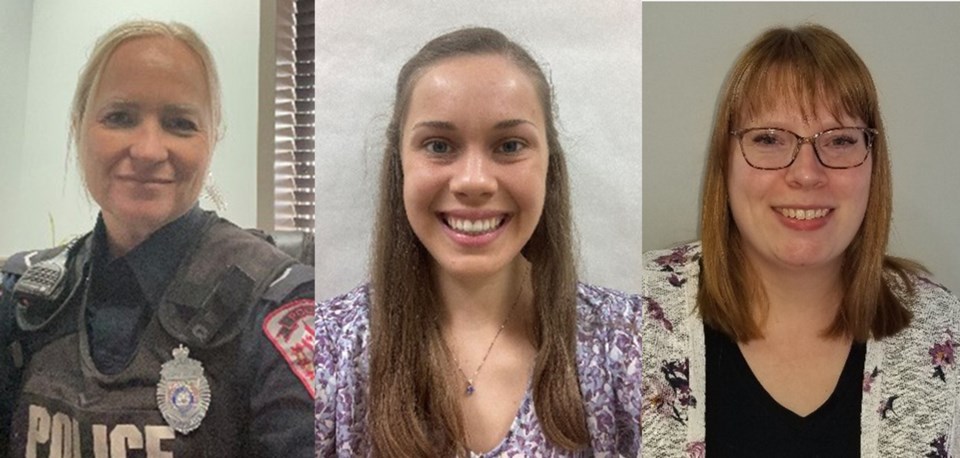ESTEVAN - The Estevan Police Service member who is part of the Police and Crisis Team (PACT) has seen the difference the unit has made since it started nine months ago.
Health workers Rebecca Antosh and Stacy Murphy have joined EPS Const. Deanna Conquergood to be part of the team. The unit started serving the community last May.
“Basically they [Antosh and Murphy] work opposite to each other,” said Conquergood. “My schedule right now overlaps the two of them and their schedule, so sometimes they’re working here without me, and they’re having to rely on patrol members to take them where they need to be.”
Funding for the PACT unit in Estevan was announced in the 2021 provincial budget.
Being part of PACT has been a learning curve, Conquergood said. The types of calls they respond to are traditionally handled by patrol members, but the EPS has seen an increase in call volumes for mental health, addictions and those who need a little more assistance in life.
“It seems like the police are kind of the last resort that people turn to for help, because they don’t know where they can go,” said Conquergood.
Dedicating a member to mental health calls frees up patrol members to respond to other calls for service, she said.
“Having the assistance of the health workers that work out of our office alongside me, I think has elevated what we can offer for services, because they have connections directly to mental health and addictions services with the health authority,” she said.
PACT members will connect people to the Envision Counselling and Support Centre and other services in the community.
“We are still in the process of seeing what else Estevan has to offer to help people get through life every day,” she said.
Conquergood works on a shift rotation, like she did when she was a patrol member. Her hours are from 10:30 a.m.-10:30 p.m., unless she has to cover off for other resource shortages.
Murphy and Antosh have varied schedules, so she might work with one of them for three days and the other for two during a five-day shift rotation.
“I do work with both of them, just sometimes I might not work with the one for a couple of weeks because of how the schedules line up,” said Conquergood.
If Conquergood is on a day off when a call occurs that requires the PACT team’s assistance, then a patrol unit member will accompany the PACT member.
Other police agencies in Saskatchewan now have a PACT team, and they handle a lot of similar calls to Estevan, Murphy said.
The calls will normally come in through dispatch rather than the PACT office. Conquergood cited the example of a disturbance or a well-being check as something they might respond to. They will often respond alongside patrol members.
“If it appears that it’s something that is not criminally involved, or it’s not an emergency … where there’s an arrest or somebody has to be transported or taken away from the scene right away, then we’ll just step in and take over the call,” Conquergood said.
The PACT team will figure out what’s happening with the individual, whether it’s mental health or addictions related, or if there’s another reason for the call. Somebody might need someone to talk to and get connected to support services somewhere through health or a community support group.
The PACT team might remain for an hour or two to talk to the person.
“Sometimes there will be a follow-up to a particular call that we will do, either later in the day or the next day, or if it’s something where the health partners have been able to set them up for an appointment, we’ll keep tabs on whether or not the individual made their appointment or if they’re needing assistance for that appointment,” said Conquergood.
Follow-ups don’t take up a lot of their time, but occasionally they will get requests from an individual’s support service, because they’re having a hard time tracking down the client.
“Typically … we’re dealing more as the first response part, and then follow-ups we’ll leave more to … the support services that a person gets connected to,” said Conquergood.
It’s nice to have a health partner who has a connection to services, she said, and the PACT team wouldn’t work if it was just police officers.
Conquergood doesn’t have a degree or background in social work, but she has participated in training and courses offered by the Saskatchewan Police College to help people in crisis. Since starting as the PACT officer, she believes she has done three or four online courses to further her understanding about mental health and addictions, helping her communicate with the people who call PACT.
Police officers are being encouraged to learn about these issues more and more, she said.
Conquergood said she wanted the role with PACT because she has seen the increase in the number of mental health calls.
“I do have a health background. I did work as a paramedic for 14 years before I came into this position, so you do work closely with health-related professionals, whether you’re on the law enforcement end of things or the health end of things. You’re working with the police service.”
It’s good to be working together to communicate, share, promote help and better the lives of individuals in the community, she said.
If it relieves the pressure on emergency rooms, if it reduces the number of people in doctors’ offices, if it reduces the number of calls for the EPS, and if people can be connected with someone who will give them their coping mechanisms, then Conquergood believes PACT is providing a positive service to the community.




